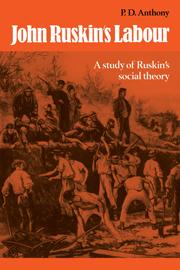5 - The division of society
Published online by Cambridge University Press: 07 October 2011
Summary
We come now to the results of the massive misunderstanding of which Ruskin accuses the economists. The consequence is a succession of splits in society so severe as to threaten its continued existence. The first of these divisions is between rich and poor brought about by capitalism. Ruskin does not complain of the fact of the distinction between rich and poor, he was a consistent defender of inequality, but he insists that capitalism has robbed that distinction of all reason and justice. It is not that the poor are poor, it is that they are poor because they have been robbed and that they are constantly reminded of this wrong by the extravagant display of the rich. A second fatal division which has been brought about by mechanisation is the division between manual and intellectual labour. A third division in society has not so much been created as irritated by capitalism; relationships between classes which should, in a just and moral society, serve to repair damage done to the weak and unfortunate, have been changed by capitalism and the pursuit of wealth so as to intensify such damage and to defend it, as natural or inevitable, even as ‘good’. A fourth division is described in terms of a general social decay and demoralisation often set out in metaphorical or even metaphysical terms. Finally, Ruskin sees these divisions as leading to revolutionary breakdown. To begin with, Ruskin warns of this outcome as a nightmare possibility unless the world mends its ways. As he became more and more pessimistic about the possibility of reform he came almost to take a savage pleasure in the prospect of inevitable revolution.
- Type
- Chapter
- Information
- John Ruskin's LabourA Study of Ruskin's Social Theory, pp. 96 - 124Publisher: Cambridge University PressPrint publication year: 1984



